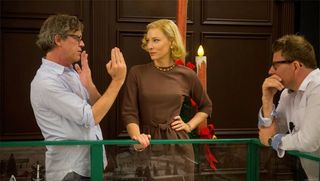Carol reaction: Cannes 2015
Todd Haynes’ Carol, starring Cate Blanchett and Rooney Mara, is now an Oscar front-runner after wowing Cannes. Here’s Jamie Graham’s reaction…
Predicting the jury’s decisions is always a fool’s game at Cannes, especially when the festival has not yet reached its halfway point. But it’s impossible to countenance a prize-giving ceremony in which Todd Haynes’ Carol does not feature. The only question is, surely, which of the gongs it scoops: Palme d’Or, Best Director or Best Actress for one or both of its leads, Cate Blanchett and Rooney Mara.
Based on Patricia Highsmith’s 1952 novel The Price Of Salt (notorious at the time, it fell out of print before being reclaimed as a feminist and gay classic), Carol tells of the titular wife, mother and socialite played by Blanchett, who spots the mousy Therese (Mara) working at the counter of a Manhattan superstore while Christmas shopping in 1950. The spark is immediate, though cupped guardedly so that no one might see, and a luncheon date quietly fans the flames. Carol’s husband, Harge (Kyle Chandler), is aware of his wife’s forbidden desires – a previous affair means that they’re heading for a divorce, which he, though cuckolded, is resistant to – and he is quick to clock what is happening here. He is also powerless to prevent it (though he tries, persistently, using their young daughter as a pawn), with Carol and Therese setting off on a Nabokovian road trip into Edward Hopper’s Americana. It is here, cocooned within the car and motel rooms, that their passion at last turns physical.

Exquisitely designed, costumed, shot, scored and acted, Carol unfurls as an intoxicating fever dream in which volcanic emotions play out with great restraint. Though, in its way, every bit as styled as Haynes’ heartfelt pastiche of Douglas Sirk’s Technicolor melodramas, Far From Heaven, this story favours a palette that is muted and muffled, a world of rain, smoke and cold, dark nights. Carol and Therese are frequently framed behind panes of glass or separated by space, with their bodies held rigidly in place by Sandy Powell’s gorgeous costumes. Carol, the older of the two, is more constrained by circumstance, knowledge and societal strictures, and is rarely to be seen without her symmetrical features perfectly painted and her hair a work of coiffed art.
Blanchett, of course, is supreme, meticulously laying out Carol’s pain, melancholy, ardour, strength and wisdom; her unhurried underplaying adds considerably to the accumulative emotional power, for it is the final third, and especially the final scenes, that the true force of the film's feeling announces itself. It is to Mara’s immense credit that she matches her co-star scene for scene, lust for lust, quiet agony for quiet agony. Therese is a very different proposition to Mara’s girl with the dragon tattoo, but they share strength and fragility and a willingness to bust social taboos. This is no naif in awe of the refined older woman. Or rather it is, on one level, but it is Therese who never wavers as she reaches for what she wants in life, be it a job as a photographer at The New York Times or a life spent with another woman.
Phyllis Nagy’s screenplay is an immaculate distillation of Highsmith’s novel, reverential to its source but unafraid to make several small, successful changes, and it’s hard to think of a better fit for the material than Haynes. From Safe to Far From Heaven to HBO’s Mildred Pierce, he’s long proved adept at bringing female stories to the screen, and here fashions a consummate movie to rival anything on his resume to date.
In partnership with Microsoft, powered by the HP Spectre 360
Sign up to the GamesRadar+ Newsletter
Weekly digests, tales from the communities you love, and more
The Total Film team are made up of the finest minds in all of film journalism. They are: Editor Jane Crowther, Deputy Editor Matt Maytum, Reviews Ed Matthew Leyland, News Editor Jordan Farley, and Online Editor Emily Murray. Expect exclusive news, reviews, features, and more from the team behind the smarter movie magazine.
Most Popular



